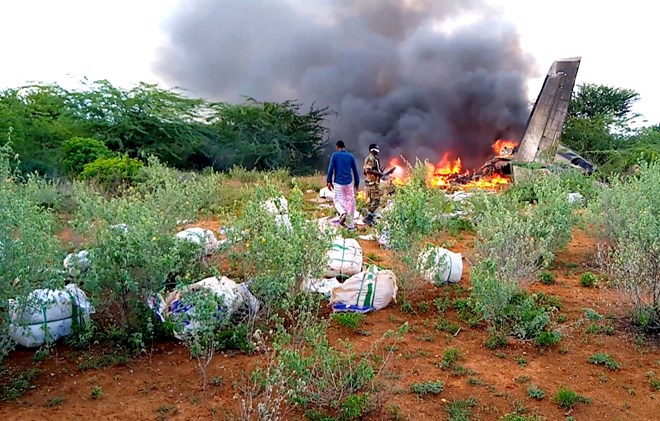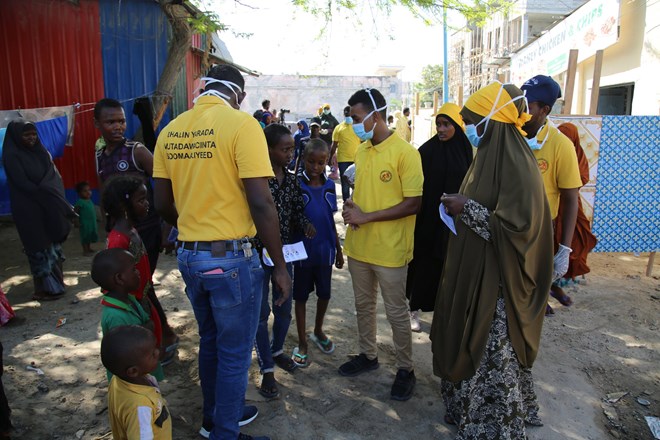
Monday May 11, 2020
By Abdi Latif Dahir

The site of the plane crash in Somalia. Credit...Reuters
NAIROBI, Kenya — A plane carrying humanitarian supplies that crashed in Somalia on Monday may have been shot down by Ethiopian troops, according to a new report from the office of the African Union Force Commander in Somalia.
The report, which was leaked on Twitter, said Ethiopian troops not affiliated with the African Union peacekeeping mission in Somalia brought down the Kenyan-registered private plane out of fear that it was about to carry out a “suicide” attack.
The Somali authorities and officials within the African Union verified the authenticity of the report, but did not confirm its findings. An investigation of the crash is still underway.
The incident adds to long-running tensions in the region, where a history of distrust and unresolved disputes between Somalia, Kenya and Ethiopia — as well as the stubborn presence of the Shabab terrorist group — threatens security and stability.
The cargo flight plunged to the earth on the afternoon of May 4 in the town of Bardale, in southwestern Somalia, killing all six people aboard. The plane had approached the airfield in Bardale from the west instead of the east, which is more common.
The aircraft, owned by African Express Airways, was carrying supplies to assist in the fight against the coronavirus pandemic. It initially left the capital Mogadishu and stopped in Baidoa before heading to Bardale.
The airstrip and the town surrounding it are secured by Somali and Ethiopian troops. They are part of an African Union peacekeeping mission meant to help Somalia fight the Shabab, a terrorist group linked to Al Qaeda.
The one-page incident report that was leaked said that Ethiopian troops not affiliated with the peacekeeping mission had shot down the plane because of its irregular flight path. The report concluded that “lack of communication and awareness” on the part of the Ethiopian troops led them to fire at the plane.
The African Union Mission in Somalia and Ethiopia’s defense and foreign ministries did not respond to multiple requests for comment. Officials at the office of Ethiopia’s prime minister said they were “still waiting for details.”

A refugee camp in Mogadishu. The cargo plane was carrying supplies to fight the coronavirus in Somalia.Credit...Sadak Mohamed/Anadolu Agency, via Getty Images
Officials in the region who read the report cautioned against jumping to conclusions before the full investigation is completed, and pointed to clear factual errors in the leaked incident report. as well as some contradictions.
The report suggested that five people had died in the crash instead of the six people reported by the airline. And after saying the plane had been shot down, it said “the aircraft crashed on the ground because its wheel was not ready to land.”
“At this stage it would be premature and not even responsible to go to any conclusion,” said Smaïl Chergui, the African Union Peace and Security Commissioner.
Mr. Chergui said the African Union Force command in Somalia, which oversees the military component of the peacekeeping mission, “does not have all the means and experience” to determine the cause of the crash.
“You don’t know why the pilot came west of east,” he said. “There are many elements to take into account.”
Somali, Kenyan and Ethiopian officials visited the site of the crash and are set to hold a joint investigations. Somali transport officials said this weekend that they expect to release a preliminary report within 45 days. The examination of the so-called black box will require external investigators and may take up to three months.
The leaked report prompted some Somali leaders to ask why Ethiopian troops not a part of the peacekeeping mission were deployed in the region. Ethiopian troops have in the past crossed into Somalia, driven by both strategic motivations and regional politicking against the backdrop of fighting the Shabab.
“The incident shines an uncomfortable light on the seeming lack of coordination among Ethiopian and Kenyan actors active in Somalia,” said Murithi Mutiga, the project director for the Horn of Africa at the International Crisis Group, a nonprofit.
With the crash ratcheting up tensions, Mr. Mutiga said, “the best way forward is for all parties to keep channels of communication open and to ensure something like this does not happen again.”
Hussein Mohamed contributed reporting from Mogadishu, Somalia, and Simon Marks from Addis Ababa, Ethiopia.